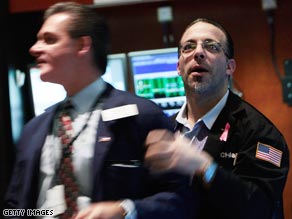NEW YORK – Starbucks Corp. plans to slash nearly 7,000 more jobs during a new round of store closures and other cuts, the company said as it reported Wednesday that its profit dropped by more than two-thirds in its fiscal first quarter.
The gourmet coffee chain plans to close 300 underperforming stores around the world — including 200 in the U.S. — by the end of the fiscal year in addition to the 600 U.S. stores it began closing this summer.
The new store closures could result in the loss of 6,000 jobs, but the company said it will try to offer employees transfers to other nearby locations.
Starbucks also plans to lay off about 700 non-store employees and has reduced the number of new stores it plans to open.
The cuts and changes will result in about $500 million in savings in fiscal 2009, the company said.
With the recession now well into its second year, consumers concerned more about the possibility of losing their jobs than maintaining a $4 daily latte habit are increasingly forgoing the company's brew.
Starbucks also has had to make room for a new lower-priced competitor in the specialty-coffee industry since McDonald's Corp. introduced espresso-based coffee drinks in its U.S. stores.
On a conference call with investors, Chief Executive Howard Schultz implored Wall Street to focus on the company's attempts to bolster its business for the long term instead of worrying about its quarterly profit and sales results.
"We believe all of the work we are doing will pay off in the long run," Schultz said. "We feel good about the progress we are making."
Edward Jones analyst Jack Russo said the cuts make sense given the decline in Starbucks' sales in recent quarters.
"This is going to be a transition year," Russo said. He said the company will have to "claw their way back."
Wall Street had largely expected Starbucks to report dismal performance for the quarter, which ended Dec. 28, because it had warned last month that slow sales likely would cause it to miss analysts' estimates.
Heeding the company's warning, analysts lowered their average expectation from 22 cents per share to 17 cents per share.
But the company still fell short, with net income of $64.3 million, or 9 cents per share, down 69 percent from $208.1 million, or 28 cents per share a year earlier.
Excluding charges from closing the 600 U.S. stores and 61 stores in Australia, the company's profit was still 2 cents per share shy of analysts' estimates, which typically exclude special items.
Revenue fell to $2.62 billion from $2.77 billion, while analysts had predicted revenue of $2.70 billion.
The revenue drop stemmed from a 9 percent decline in same-store sales, or sales at locations open at least a year, considered a key gauge of restaurant and retail performance. That dip was worse than the company's fourth-quarter decline of 8 percent.
The company's U.S. same-store sales dropped 10 percent in the first quarter. The company said its international business suffered the most in Canada and the U.K.
Schultz said Starbucks will offer customers more value through breakfast "pairings" at new prices but declined to offer any specifics.
Starbucks also said Schultz asked the company's board of directors to cut his salary last week. The board agreed to pay Schultz just $10,000 in base salary for fiscal 2009, including health insurance and other benefits.
Schultz, whose salary was $1.2 million in 2008, still could take home millions in the form of stock options. In the last fiscal year, he received stock options worth $7.8 million when granted, which helped boost his total compensation near $10 million.
The company said it plans to open only 140 new stores in the U.S. in fiscal 2009, down from its previous target of 200. Overseas, it will open 170, down from the 270 it had planned to open.
Starbucks added it would sell one of its two corporate planes and will reach out to landlords to try to negotiate lower rents for its stores.
The company also said it will not provide any sales or earnings guidance "given the uncertainty in the global consumer retail environment."
The company also declined on the conference call to discuss sales trends for January.
Shares fell 24 cents to $9.41 in electronic after-hours trading after rising more than 5 percent during regular trading Wednesday.
 Starbucks barista Alex Igarta hands a coffee drink to a customer from a drive-up window at a store near
Starbucks barista Alex Igarta hands a coffee drink to a customer from a drive-up window at a store near
